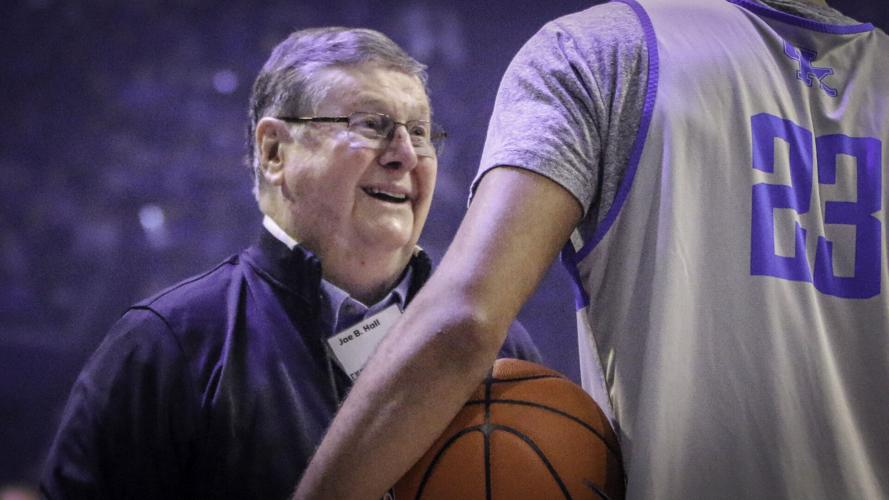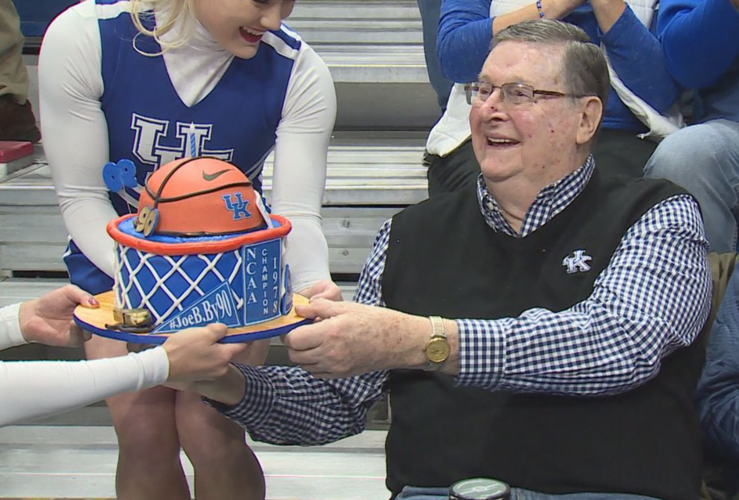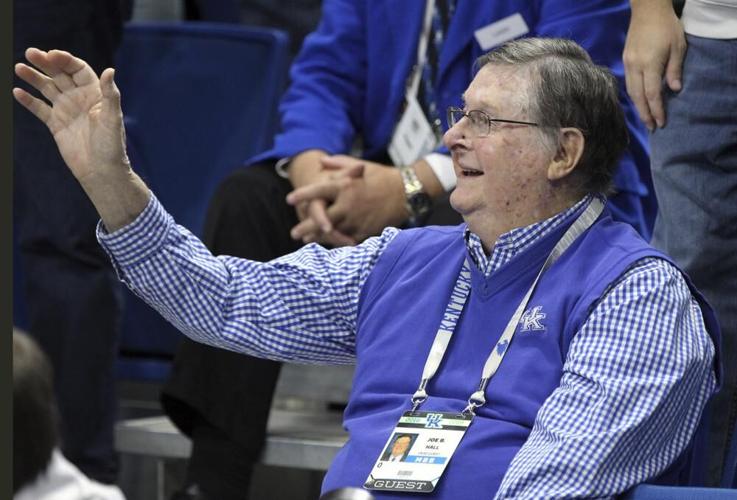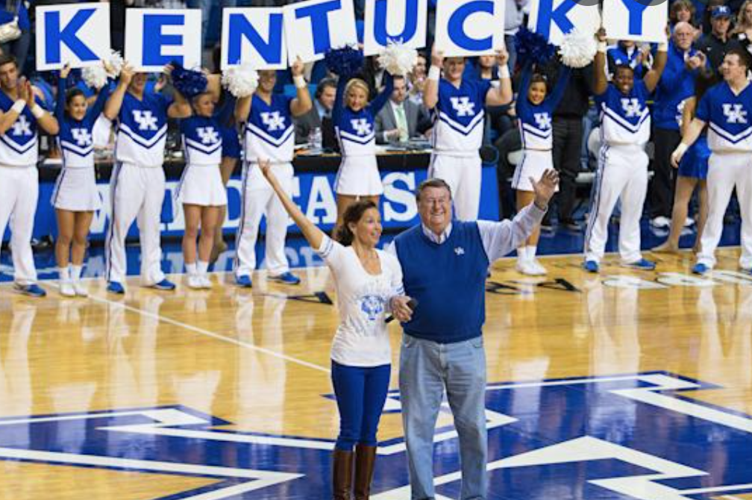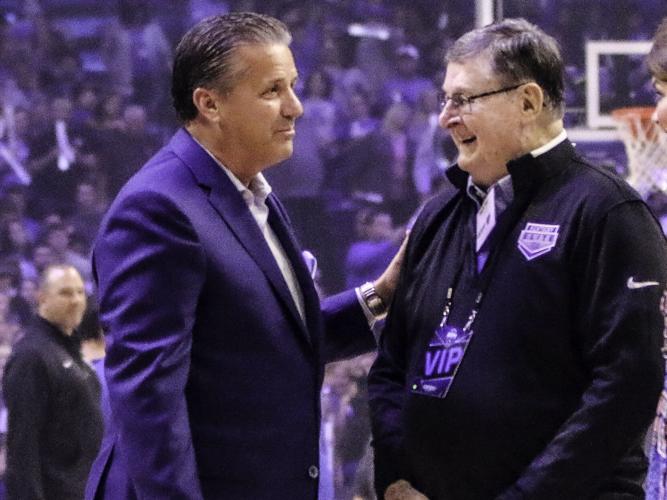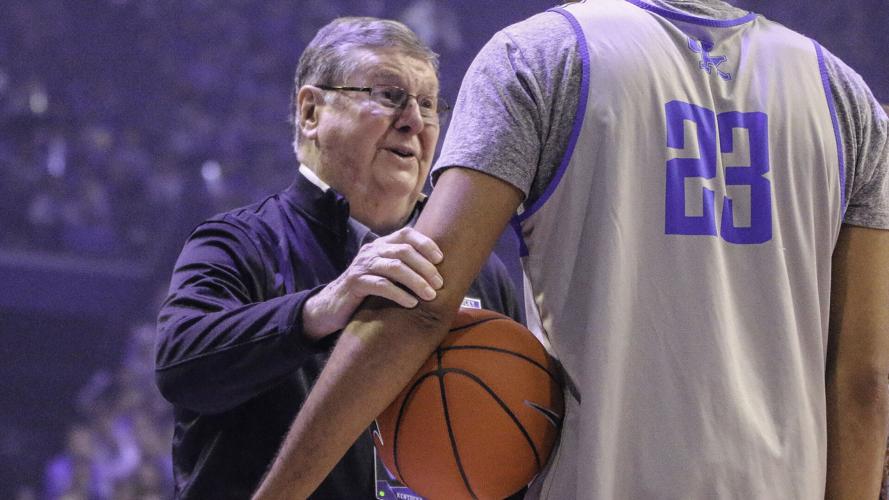LOUISVILLE, Ky. (WDRB) — Let’s begin where everybody begins:
Joe B. Hall showed the world how to follow a legend. His assignment was to follow Adolph Rupp at Kentucky. Hall did it as graciously and successfully as a legend can be followed.
Now let’s move to the story that deserves larger, bolder headlines:
Joe B. Hall did the work of a legend, too. He set the University of Kentucky basketball program on course for the greatness that has followed
What Rupp created, Hall upgraded.
Improved. Broadened. Modernized. Developed. Protected. Celebrated. And eventually enjoyed — usually with a smile and lovely laugh from his midcourt seat across from the opposing bench at Rupp Arena.
Hall, 93, died Saturday in Lexington, the town where he did so many great things. There will plenty of talk about how Hall followed the iconic Rupp more successfully than anybody at UCLA followed John Wooden or anybody at Alabama followed Bear Bryant (until Nick Saban).
Hall proved you can be the man who follows The Man, winning the 1978 NCAA title and taking Kentucky to two other Final Fours.
But when the people who select the college coaches that belong in the Basketball Hall of Fame take a wide-angle look at Hall’s achievements, they will find considerably more. Joe B. Hall did many things that are Springfield-worthy, too.
Hall’s work at integrating the Kentucky basketball program is the best place to start. Rupp was never in a rush to bring the first Black basketball player to Kentucky.
Tom Payne, of Shawnee High School in Louisville, was Rupp’s choice as UK’s first Black player. Rupp signed Payne in 1969, three years after an all-white Kentucky team was defeated by an all-Black Texas Western team in the NCAA Final and more than a decade after many Big Ten and Big 12 programs integrated.
Hall replaced Rupp after the 1972 season. Recruiting, developing and featuring Black players was a priority for Hall.
The 1978 team picture shows six of the team’s 14 players were Black, including guys who scored 59 points when the Wildcats defeated Duke, 94-88, as Hall brought the program its fifth national title. Until that team, Black players had scored 0 points when the Wildcats won their first four national titles.
Look closer at that team photo. Hall also integrated Kentucky’s coach staff. Not many Southeastern Conference programs rushed to make that happen.

He hired Leonard Hamilton. Hall did more that entrust Hamilton with recruiting. He developed him as a leader and a coach, a coach who has now won more than 600 games. The Hall-Hamilton friendship resonated for a lifetime, with Hamilton regularly making time to see Hall when he was in Kentucky.
Hall and his staff did not need recruiting gurus to take Kentucky’s recruiting national. They knew where the best players were — and brought them to Lexington.
During the 1978-79 season, Hall landed his first super class. Kentucky signed Dirk Minniefield (Lexington); Charles Hurt (Shelby County); Derrick Hord (Bristol, Tenn.) and Sam Bowie (Lebanon, Pa.). Want more envelope pushing? All four guys played with their high school teams in a double-header at Freedom Hall.
The obsession with recruiting was on, heightened the following season when Hall signed another top class with Melvin Turpin (Lexington); Dicky Beal (Covington, Ky.); Jim Master (Fort Wayne, Ind.) and Bret Bearup (Long Island).
Fun fact: Hall was also on board with international recruiting. UK assistant Jim Hatfield found a 7-foot-4 center in Cologne, West Germany, named Gunther Behnke. Alas, Hatfield spent more time in Europe recruiting Behnke than Behnke spent in Lexington. Homesick for his girlfriend, Behnke left UK in less than a week. But Hall always searched for that edge.
Give Hall credit when you notice how strong and powerful today’s players are. Emphasizing strength and weight training was a Joe B. Hall priority. In 1978, most teams had no answers for the thunderous strength of Rick Robey, James Lee and Mike Phillips. Some coaches complained that Kentucky played “bully ball.” Kentucky kept pounding the boards and won 30 of 32 games.
Hall did some of this with Rupp looking over his shoulder. Hall took over for a coach who set the NCAA record for victories. Rupp wanted to keep adding to his 876 wins but was forced to retire. Rupp was not forced to give up his television show even after Hall coached the team.
For most coaches that would be too much. Gene Bartow lasted two seasons as Wooden’s successor at UCLA. Bill Guthridge quit after three years when he followed Dean Smith at North Carolina. Mike Davis was fired six seasons after he replaced Bob Knight at Indiana.
Hall won nearly 75% of his games and at least part of eight Southeastern Conference titles while coaching 13 seasons, two more than Bartow, Guthridge and Davis combined.
Five coaches have followed Hall at Kentucky — and he was always there to shake the hands and cheer for Eddie Sutton, Rick Pitino, Tubby Smith, Billy Gillispie and John Calipari.
All of those things are examples that Joe B. Hall understood the value of being eager to evolve. You cannot write about Coach Hall without discussing his relationship with the University of Louisville.
Hall was never in a rush to acknowledge U of L. Scheduling the Cardinals was out of the question.
Denny Crum came to Louisville from UCLA in 1972 and quickly chirped that he had better players than the ones that Hall recruited to Kentucky. If anything, that made Hall more determined not to play the Cardinals.
Crum persisted. Hall resisted. Would these two ever work it out?
Not until the NCAA bracket matched UK and U of L at a regional final in Knoxville, Tenn., on March 26, 1983. The record shows the winner was Louisville, 80-68, in overtime. The record does not tell the big picture.
The winner that day was basketball fans in the state of Kentucky and beyond. In November 1983 at Rupp Arena, Kentucky got its revenge as the programs did the reasonable thing and started an annual series, a series now in its fifth decade. Thank you, Coach Crum and Coach Hall.
Legitimate adversaries for years, Hall and Crum became friends. Instead of firing zingers, they shared one-liners and tales of golf, hunting and fishing.
They partnered for an entertaining radio show that proved Cardinals and Wildcats can absolutely get along. They became so close they finished each other’s thoughts.
Joe B. Hall did more than prove a legend can be followed. Joe B. Hall showed that he lived a legendary life, too.
Copyright 2022 WDRB Media. All rights reserved.
